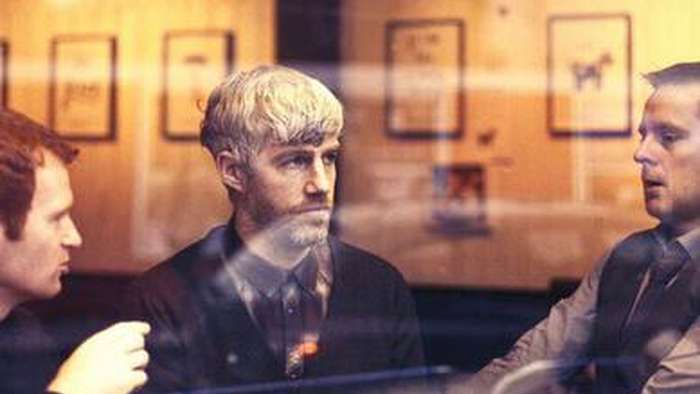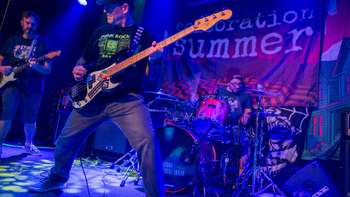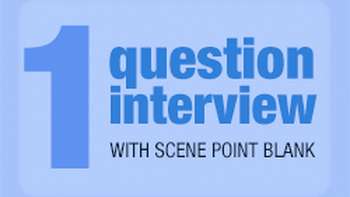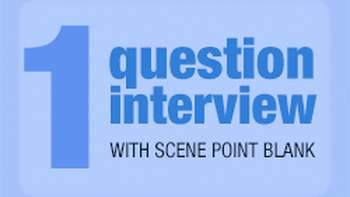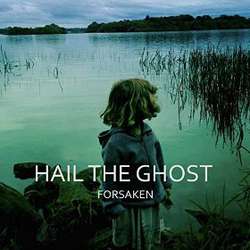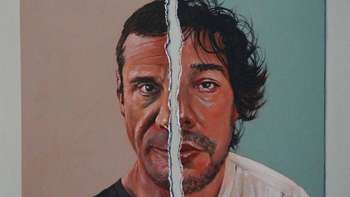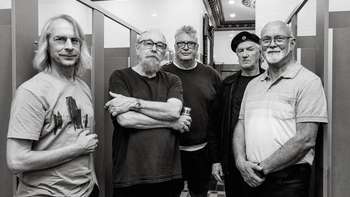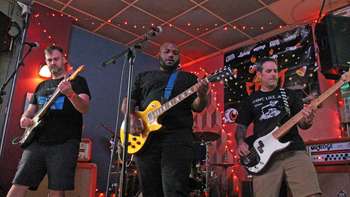Irish indie six-piece White McKenzie never officially broke up, they just went quiet. Frontman Kieran O'Reilly secured an acting role in the hugely popular Irish crime drama Love/Hate, where art imitated life as he played Detective Ciaran Madden in the series while also continuing with his day job working as an undercover drugs detective in the Irish police force. White McKenzie's social media accounts went quiet, and just a few months ago following his acting success Kieran reappeared on the Irish indie music scene with two of his former White McKenzie bandmates, guitarist Eamonn Young and keyboardist Ian Corr, working as a three-piece under the name Hail The Ghost. They left behind the grungey, heavy sound of White McKenzie and indulged in a more nuanced, weighty sound on Hail The Ghost's debut album Forsaken, a phenomenally layered, National-esque exploration of melancholy. Here Kieran tells SPB about how Hail The Ghost came to be, what exactly happened to White McKenzie and the future of Love/Hate.
Scene Point Blank: I know yourself, Eamonn and Ian were in White McKenzie, and I was wondering did White McKenzie fizzle out or did the three of you decide you wanted to make music more in the vein of Hail The Ghost instead?
Kieran O'Reilly: [Laughs] I was actually waiting for someone to ask this question and no one did. Well, I wasn't waiting for it, I was just anticipating that someone might and they didn't. What happened with White McKenzie was that we were struggling towards the end of 2012, I think, creatively. In the sense that we seemed to branch off into various strands of individualism, and I don't believe [the strands] came together as appropriately as they should have. I don't think we were naturally creating songs, I don't think we knew what we were in that regard. I think that we had an identity crisis, musically.
Scene Point Blank: So you just lost direction, was it?
Kieran: I think so. I think that as we were evolving as a band we were also evolving as individuals, creatively. I just felt that it seemed quite frustrated, creatively. I made the decision to leave. I set up White McKenzie, so it was an ironic decision for me. I just felt that I didn't really want to pursue it any longer, and I wanted to preserve the friendships that were there. Which we did, we're all still great friends. I just felt that we didn't know what we were doing, and I think the lads felt the same. I felt we worked really really hard in that band.
Scene Point Blank: Had it come to its end?
Kieran: I think that we could've gone on, but I think that we would've been flogging a dead horse in a way.
Scene Point Blank: If you're not really into it any more, there's no point in continuing.
Kieran: I think we were all trying to move forward as a band, but we were actually moving forward at different paces individually. So we were all going in different directions, I felt. But the directions that we were all moving in didn't necessarily blend together naturally. We were losing our direction, I thought. We had that little bit of grunge [in White McKenzie].
Scene Point Blank: It was a bit like Pearl Jam, I thought. It's that kind of sound. But you can hear that there's a distinct difference between Hail The Ghost and White McKenzie. It's just my opinion, but it seems like you wouldn't have gotten one without the other. They're very different, but it seems like a natural progression at the same time.
Kieran: I think I agree with you. It's not saying that anyone's better than the other, basically it's just saying that I think that there's more comfort in an assured direction. I think that if we went back to reform White McKenzie we'd be a different band.
Scene Point Blank: You'd all have different ideas going on.
Kieran: We would, but I think we'd have to iron out stuff before we even play. I made the decision to start Hail The Ghost. I rang Ian and Eamonn, and we met and I said "look, this is my idea. This is the kind of style. I think we should play to our strengths. Probably do what we were doing, what we touched on in White McKenzie, but we should embrace that and go down this route." Which was if you got [music] like Sigur Ros and Other Lives.
Scene Point Blank: The National's definitely in there.
Kieran: Yeah. The National, The Antlers and all that.
Scene Point Blank: There's a bit of Elbow as well I think, on "Lazise".
Kieran: Yeah, there was definitely some Elbow influence there as well. So if you got all of those things, and took that White McKenzie component as well. I was saying that we should try and be stringent about fast tracking a style and trying to keep to it, just for this record anyway.
Scene Point Blank: It's all very cohesive. It all blends. Not in a reductive sense, but it all fits together.
Kieran: Cool. That was the objective, in that we would have an album of tracks that belong together. The other objective was that when we were writing we actually wanted the whole album to be taken as one...
Scene Point Blank: Like as one piece?
Kieran: Yes. Not individual songs, that's why we wanted to do an album. I know some people do singles and EPs and everything else. We had a specific reason for writing an album, which was that we would have a piece that would have that cohesive feel to it, we would have that thematic thing and we would also have a story, beginning to end. Though it's not necessarily a story [in a book] sense, but like an actual journey.
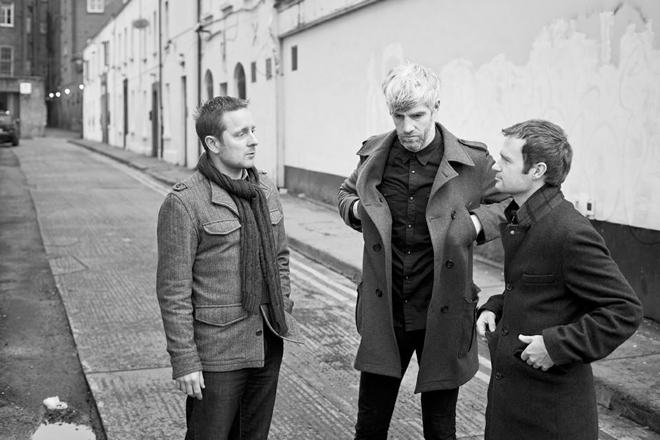
Scene Point Blank: For how long had Forsaken been a work in progress before you actually finished it? How long had you been planning away at it?
Kieran: I did a bit before I started with the lads. We spent a very full-on, intense year, which doesn't sound like a long time in some respects. I was producing the album with Martin Quinn who's from Jam Studios, and at times I did a lot of stuff with notebooks and phones and all that type of stuff. At one stage I felt I was going mad. It's a peculiar thing in a way, at one stage I'd mapped out the album and I'd mapped out what songs were going where, but some of the songs hadn't even been written. So it really was constructed from the ground up. I knew "Nostalgia" would open it, that there would be this kind of airy, atmospheric type of sonic intent that would unveil [the album]. The intent was that that track would also start the gigs, that it was that type of track.
Scene Point Blank: So you knew fairly early on what introduction you wanted to the music then?
Kieran: Yeah, and I knew that "Drift" was going to be the last song and that it was going to be a mantra-like, camp firey play-out, acoustic type of song, to essentially be like a musical exhale after the nine songs that preceded it.
Scene Point Blank: And would those two songs be the earliest ones you'd written for Hail The Ghost?
Kieran: The first song we recorded was "White Heart", and that was really important because it was done very disjointedly. For that particular song, Eamonn had come up with a little melody at the start and I had arranged the whole song around it, and the lads hadn't heard the full arrangement until we left the studio. So it was a big thing, where they were saying "Oh Jesus, what are we going in to here?" and there were little bits that I had been singing in to phones or [music] I'd put down myself.
Scene Point Blank: Like collecting it along the way.
Kieran: Yeah, basically. Sometimes I'd stew over stuff. A good example would be that I had a chord sequence and a tempo but I didn't have a melody, and Ian sent me the melody of "Headstoned" from the chord sequence and the tempo. So he sent this through and I stewed over it for two months, and I wrote the whole song around it and arranged it. But those things were from obsessing over what [Ian] had put down.
Scene Point Blank: Were there any eureka moments when you were working on the album where you just thought everything was coming together exactly how you wanted it to?
Kieran: I kind of hit a wall at one point, and couldn't get around it. I just could not get around it, and creatively I just seemed to be spent. I was listening to the War On Drugs album Lost in the Dream and I wasn't deliberately trying to do anything. I was just listening to that and I was listening to Elbow's latest album, just as a form of procrastination really. And I was listening to Mogwai's Rave Tapes. With all of that in my head, one of the days I just picked up the acoustic guitar and I felt I had a eureka moment because I ended up writing "Low Lying Fog".
Scene Point Blank: That's one of my favourites on the album, actually. That one and "Gabriel".
Kieran: "Gabriel" was actually a White McKenzie song. I wrote that song years ago. Initially, in its first form, it was a grunge type of song. Then when we tried to work on it in White McKenzie, I thought it ended up becoming one of our best songs. It was something like Interpol, and I think we all felt that it was so good that we didn't want to leave it in White McKenzie. It's actually a very personal song that I wrote about myself.
Scene Point Blank: Really? There's a question that I came up with derived from listening to that song. It was, do you take on characters when you write lyrics, like you would when you're acting? I had "Gabriel" in mind specifically but I just thought that maybe that was you...
Kieran: Inhabiting some kind of...
Scene Point Blank: Yeah, inhabiting someone else. Because it's quite strong [in a harsh way].
Kieran: When I'm writing, it's not necessarily "yes, I inhabit other characters". But essentially I explore very different places within me. I think that goes halfway to meeting you, in the sense that I don't try and inhabit other characters, but I have toyed with the concept for other things. But for me, on this album, no. I searched myself a lot, and some aspects of me, I find, really require searching.
Scene Point Blank: Your lyrics seem to go between being really introspective and then addressing people. Specifically a line from "Ink & Blood" that really struck me was "step down from that bridge that you stand on", and I was wondering if you use lyrics as catharsis or do you also use them as a way to get a message across to someone?
Kieran: Both.
Scene Point Blank: Do you do one more than the other or is it an even mix?
Kieran: Everything I wrote for the album, if it's not an experience I've been exposed to myself, it's something that has moved me or inspired me from hearing about it. But it's nearly that I'd hear about it first-hand. "Ink & Blood" is about a friend and I was moved by their situation, to the extent that I had to write. There's some very personal songs [on the album], "White Heart" is probably the only song that I can actually say what it is, because I don't think the person would mind.
It's about one of my best friends who lost his mam. I wrote about him in White McKenzie as well, he was "The Big Man". His mam was diagnosed with pancreatic cancer, at 66. I've never known a person to idolise their mother so much. I've never known a mother and son to have such an extremely amazing bond. They really complemented each other amazingly. It was very humbling to be witness to that. Further to that, I was privileged enough to know the woman, and she was an absolute sweetheart. I could see the gravity of that reality for him, it was absolutely crushing. So "The Big Man" was more to show support, and maybe explain what he was going through. It was kind of clandestine in some respects, because he wasn't very overt, nor was that how he dealt with things. It was all behind the scenes that it was killing him. She was such an amazing woman, she defied all the odds and she lasted about four and a half years before she died.
Scene Point Blank: That's very long.
Kieran: It's very long, and it's kind of unheard of. And "White Heart" was about him losing his mam, basically. So he's doing well, he's got a song on each album [laughs]. But before, and I've had to do this a couple of times on this album, before I write about someone, I contact them and ask them.
Scene Point Blank: Has anyone ever said no?
Kieran: No. But, I did write a song once and I hadn't consulted the person. It was about a loss that they'd had. And I did it so that it wasn't very obvious, but I don't think that person was impressed that I would take the liberty to do something like that. That was a good few years ago, so I'm extremely aware of that. "4am" [a White McKenzie song - SPB] was about my best friend. I asked him. I've written a lot of songs about a lot of friends and I would always ask them.

Scene Point Blank: I'm just going to ask you about "Lazise". I find it weird that you said it was Elbow's latest album that you were listening album you were listening to, because when I hear that song it reminds me of Cast of Thousands. It seems to have that kind of atmosphere to it. I think it acts as a curve ball amongst the sombre tone of Forsaken. It's between the middle and the end of the album, and I was wondering if that was intentionally placed there when you were tracklisting?
Kieran: Yes, it was.
Scene Point Blank: And when you were writing it did you have it in mind thinking it would be a little switch from the rest of the album?
Kieran: Well, I'll explain what happened with "Lazise". It was kind of the black sheep in some respects. I remember Eamonn came down to my house and we were just thrashing through bits and I gave him a load of CDs and said "here, listen to these and see what you think." I remember he was working on his own, and he came down to the house and said [excitedly] "I've got this thing, I've got this thing", so I said "okay, go on." And he played the melody from "Lazise", and I said "Jesus Eamonn, that's beautiful." I said "look, I could definitely write something for that if you just bear with me with it." I remember sitting with it, and all I could think was that this will definitely have its own place on the album. It will nearly be a departure from the album, but it will have its relevance. Initially I thought it might be an instrumental.
Eamonn and Ian, they were working on stuff together, and they said that they'd work on that song. They went on a totally different direction with it, but I thought that Eamonn's melody was so strong that it had to feature. So I asked Eamonn if he'd just let me do what I want with it. In fairness, he did, and I think we came out with something kind of brilliant. But it's all down to Eamonn's melody, the thing that he wrote was so nice that it needed to be nurtured all the way through.
Scene Point Blank: There was no way you could let that go. It's strange in that it doesn't sound like anything else on the album, but it absolutely belongs.
Kieran: I'm not good at writing happy stuff, but there's kind of a happy feel to it.
Scene Point Blank: I've a feeling this is probably going to be a no, since you've told me that you write most of your lyrics about people you know, but I was going to ask you about your job. You've worked undercover in the National Drugs Unit, and I was wondering did anything you ever saw or experienced influence any music you've ever made? Obviously I know you can't be specific.
Kieran: You mean any music I've ever written, ever?
Scene Point Blank: Yeah. Have you ever seen something that you wouldn't have otherwise seen that's prompted you to write a song?
Kieran: I think, if you write, in some fashion you regurgitate what you see or observe or what you absorb. I think that for someone who writes songs it would be impossible to totally screen that aspect of my life. Just to answer your question, yes I have written songs about stuff from my working life, but I can't...
Scene Point Blank: You can't say what it would've been, I presume. You were in the Irish ad for EA's Battlefield: Hardline game with your Love/Hate co-star Laurence Kinlan. How did that come about?
Kieran: From what I know, EA Sports looked for me.
Scene Point Blank: They came looking for your and Laurence Kinlan?
Kieran: Yeah.
Scene Point Blank: It's a good ad.
Kieran: You think so?
Scene Point Blank: Yeah. You don't expect the computer game at the end of it, because it starts off really intense.
Kieran: Oh, does it?
Scene Point Blank: Yeah. Have you not seen it yet?
Kieran: Oh I did yeah, but I can't...
Scene Point Blank: You can't see how it looks to someone else?
Kieran: Yeah, exactly. It's like the Fran scene at the toll bridge [a pivotal moment in Love/Hate where Det. Ciaran catches up with his criminal nemesis Fran at a toll bridge, there are guns - SPB's crime drama correspondent] obviously I was there and everything else, but it came across far more intense when people saw it than I remember it. I don't have a good capacity...
Scene Point Blank: To know how other people are taking it in?
Kieran: Yeah, exactly. If you feel it on the day it's great, but I wasn't expecting the impact of that scene to carry so much. I think it's great that the ad seems intense, and I think it's great that the toll bridge scene in Love/Hate is intense.
Scene Point Blank: The toll bridge scene in Love/Hate is brilliant because it's what you want to happen, it's what you've been waiting for.
Kieran: The amount of people that thought I was going to be shot was huge! But I was laughing going "it's mad", people's minds do really run away with them.
Scene Point Blank: You get really into it though. I didn't think you were going to be shot, because you already had the gun ready when he was still in the car!
Kieran: [Laughs] It's funny, but it's great.

Scene Point Blank: Do you have a preference over one or the other, would you consider yourself more of an actor or more of a musician?
Kieran: I think I'll always write music, because I think I have to.
Scene Point Blank: It's almost like an impulse.
Kieran: Yeah, but I think it's kind of therapy. Even if it's not publicly, like touring or gigging, I always write stuff and I want to record it to immortalise it, so I don't lose it. I think I'll always do music. But I think with acting I've got a lot to learn, and I don't think I've reached my potential yet. I think I've got a lot more to give. And there's a lot more I want to do.
Scene Point Blank: I saw in an interview you said you weren't sure if Love/Hate would come back again for another series. I won't rehash the question, don't worry!
Kieran: I don't know, that's really down to Stuart Carolan [the writer and creator of Love/Hate - SPB], and if he decides he wants to do something.
Scene Point Blank: Ireland has needed a good drama series for a good few years, and it's going so well. They're selling Love/Hate all over the world.
Kieran: I think Stuart needs to sort himself out and write something quick, because I think that people need his talent to feed off that. I don't think that he should be allowed to have a break [laughs].
Scene Point Blank: You're going to be playing in Whelan's soon, and you're going to be rehearsing tonight. How are the rehearsals going, are you excited to finally play Forsaken live?
Kieran: The emphasis was on writing an album, and not worrying about anything after it. That the base would be to secure exactly what we needed on the record, and get everything the way we wanted it to be and not really place any emphasis on live stuff. Then when we were coming to the end [of recording] we were like "okay, we're going to start playing live and we'll have to import some musicians" and stuff like that. Because to replicate it live, it's not feasible.
Scene Point Blank: Because you play the drums as well.
Kieran: Yeah. Drums and vocals, and a small bit of guitar. So we've had to get some musicians in. So we've got Gavin Mulhall, he's a multi-instrumental solo artist, so he's playing drums. And Paul Higgins from DC Tempest, he was in Doris [Kieran's first band - SPB] as well, he's playing guitar. Martin Quinn from Jam Studios, who co-produced the album, he's playing bass. Rehearsals are going a bit like a teenager cramming for an exam, at the moment. Rehearsals are going well, but we've still got a bit to go. Over the next two weeks we'll just tighten up a few little bits.
Scene Point Blank: Have you tweaked any of the songs for a live version?
Kieran: Small tweaking. We're just being as loyal to the album as possible, for the moment. I think once we find our feet then we'll probably try and be creative with it, and write more songs as well. I was kind of thinking, would there be a second album. And I think there will be.
Scene Point Blank: Have you already started working on lyrics?
Kieran: I had some stuff that I was thinking about yesterday, and I was going to go for my guitar and I just said "ah here, I've got too much going on."
Scene Point Blank: One thing at a time.
Kieran: Yeah. I mean, I'm still in the The Actors Studio on Bow Street.
Scene Point Blank: That's for acting training, isn't it?
Kieran: Yeah, kind of. It's the actors studio for screen acting. It's like a commune where all these actors come together and they do scenes and workshop stuff, and they would do their own workshops. Shimmy Marcus runs it, he's a director, and he's very good. Some of us did a Cathy Brady workshop, she's a two time IFTA-winning director, and she's very very very good. So that was extremely rewarding, doing that. There's always something going on.
Scene Point Blank: It all sounds really fulfilling. I mean, you're a Garda [Irish police officer - SPB], and that's not a run of the mill job, that's the kind of thing that's almost like a vocation - you have to really want to do it. It's the same with the music, and it's the same with the acting. Was there ever a point where you were worried that you wouldn't be able to indulge in all three?
Kieran: Yeah, of course. I'm just a guy who just does stuff. I don't really think I'm amazing at anything. I'd be obsessive, in a way. In that, if I start writing songs then I want to have an album on the shelf in HMV. If I want to act then I want to be in a big feature film. I always want to get better and better and better, you know.
Scene Point Blank: Lots of ambition.
Kieran: Yeah. I would have a lot of ambition, I think. And I suppose over the last year or two I've found it hard to juggle. My job is my primary responsibility, but I just can't seem to surrender my hobbies at the moment because they're too important to me. I need them, if you know what I mean.
Scene Point Blank: They're both going well too, so I guess you have enough impetus to keep going with them.
Kieran: Yeah, I suppose. When we get the Whelan's show finished, then we'll be going "we've released two singles and an album, and we've headlined Whelan's", and you think "that's good".
Scene Point Blank: Then you'll already be moving on to the next thing?
Kieran: I think it would be nice to do a small Irish tour, but I think once you get to the point where you're headlining Whelan's then it's not going to take as much application to book another few gigs or do a few rehearsals. I think the real application for me is when I've to go back to writing. The creative side of things, I find, can be kind of frustrating and consuming in a way. Sometimes, until a song is actually done the way I envisage it to be, I can get quite agitated until it's actually done.
Scene Point Blank: I'm not a musician, but I write, and I get this thing where when I'm working on something and I'm really into it sometimes I'll wake up at 3 or 4 in the morning and I'll be like "I have a line, I have to write it down." I assume it's the same for you with lyrics, like you can't relax until it's done.
Kieran: Exactly. Well it's the same thing. For this [album] there were times when I was waking up in the middle of the night typing stuff into my phone, or I'd be humming stuff into my phone.
Scene Point Blank: For the purpose of anyone who's never heard Forsaken or Hail The Ghost, what do you think would be the best way of summarising what the atmosphere on Forsaken is, or what it should evoke?
Kieran: I think that the songs on Forsaken are sincere, and I think that sincerity is enveloped in a cinematic feel, an ambient feel. I would love for people to relate to the content as well as the music.
'
